10 Types of Digital Marketing Channels to Try [in 2022]
So you want to put online efforts and go digital for your business. But there are many types of digital marketing channels out there to choose from. Now what?
Your next step is to start your digital marketing efforts. The good news is, there are several types of digital marketing out there for you to check out and try.
The not-so-good news is, you don’t want to use all your energy trying to make all these channels work for you.
How would you decide which type of digital marketing channel is right for your business? Here’s our comprehensive list of digital marketing channels for you to learn, understand, and try:
1. Organic Search

What do you do when you’re curious to know about certain topics? Where do you look for information about a specific product or service? You Google it, right?
One of the highest converting types of digital marketing channels is search engine optimization (SEO). SEO is a process of making your website rank better in search engines than your competitors.
Search engine optimization makes it easier for customers to find you. At present, there are over 99,000 Google searches done per second so it’s best that you make use of it to optimize your website and be visible in organic search.
But how can SEO make your product or service stand out from your competitors? How can you get more traffic to your website and get high conversion rates? Here are some of the SEO techniques you need to know:
- Keyword research – this is the most fundamental process in SEO. We do this to determine which keyword will help you rank and get more organic traffic for your website.
However, keyword research is not as easy as it seems. If you want to have an in-depth understanding of what it can do for your business, especially if you have a new website, you can read more about it here.
- Content – your website must have high-quality content. Why? Because not only it will drive readership from your customers, it will also help you stand out.
But how do you drive readership from your customers? It all boils down to your keywords. The more specific and relevant your keywords are to your business, the better.
In addition, when creating content for your website, don’t forget to add your keywords to your metadata. Meta Data provides Google with additional information about your website.

Meta Data includes your website’s URL or web address (Uniform Resource Locator), Title Tag, and Meta Description. Meta data lets search engines know what your website is about.
- Linkbuilding – is another integral task in SEO. The goal of link building is to get links back to your website from either the same website (internal backlinks) or other websites.
Linkbuilding is getting more “referrals” into your website so Google will see you as reputable and authoritative. Links are a huge factor in how Google ranks you. In fact, it makes up your site’s page rank to 42%!
SEO Hacker has an in-depth post on how to build backlinks to your website. You might want to refer to it in case you want to try to do it on your own first.
A quick word though. It may seem easy to build links, but don’t be fooled. Link building won’t give you results overnight. It requires a process that’s painstakingly slow to grow your website’s presence.
The same goes for SEO in general. Not only does SEO takes a huge amount of time, but it also requires immense technical SEO experience to keep up with the search engines’ constant algorithm updates. Google must make these updates to provide its users with a better experience.
Fortunately for business owners, there are SEO and digital marketing services out there that can help. SEO Hacker is an SEO and digital marketing agency that provides the best quality service because of white hat strategies and ethical processes. If you want to know how your website’s searchability is doing, you can try our FREE SEO audit tool here.
2. Website and Content

An infographic from MineWhat shows that 81% of shoppers do their online research first before they make a purchase.
What does this mean for your business? Your website must not only be visible online, but it must also have high-quality valuable content for your customers.
Your website must have all the important information and credentials your customers need. The website and content have multimedia capabilities so you can add variety to educate, entertain, and persuade your visitors.
Some types of content you might want to create are blogs, videos, infographics, case studies, social media posts, e-books, and many others.
To make website and content work for your business, you will need a content strategy. A content strategy helps you outline and define your business’ identity and purpose.
Once you have outlined your content strategy, your next step is to do content marketing. Content marketing is where you will identify which type of content you will create and promote them to increase your website traffic.
Ultimately, your goal is to solve your customers’ pain points when they visit your website.
3. Word of Mouth

To me, nothing beats this most powerful type of marketing because it speaks volumes about loyalty and trust. It reflects how we serve our business partners with their digital marketing needs. In fact, I find this to be my favorite marketing strategy! Here’s why.
Nowadays, consumers rely heavily on what other consumers have to say about the brand. Consumers rely less on the brand’s paid advertising.
A study from Invespcro shows that word-of-mouth marketing drives five times more sales than paid media. In addition, consumers are more likely to trust and buy from a brand recommended by family or a friend over a brand employee.
Contrary to what the majority believe, WOM (word-of-mouth) marketing can also be done in the form of online customer reviews.
It’s likely you’ve done word of mouth at some point as well. When you meet with your friends and you can’t help but rave about a great product or service, that’s a word of mouth marketing already!
The key to achieving successful WOM is to create a top-notch experience and service for your customers.
4. Email
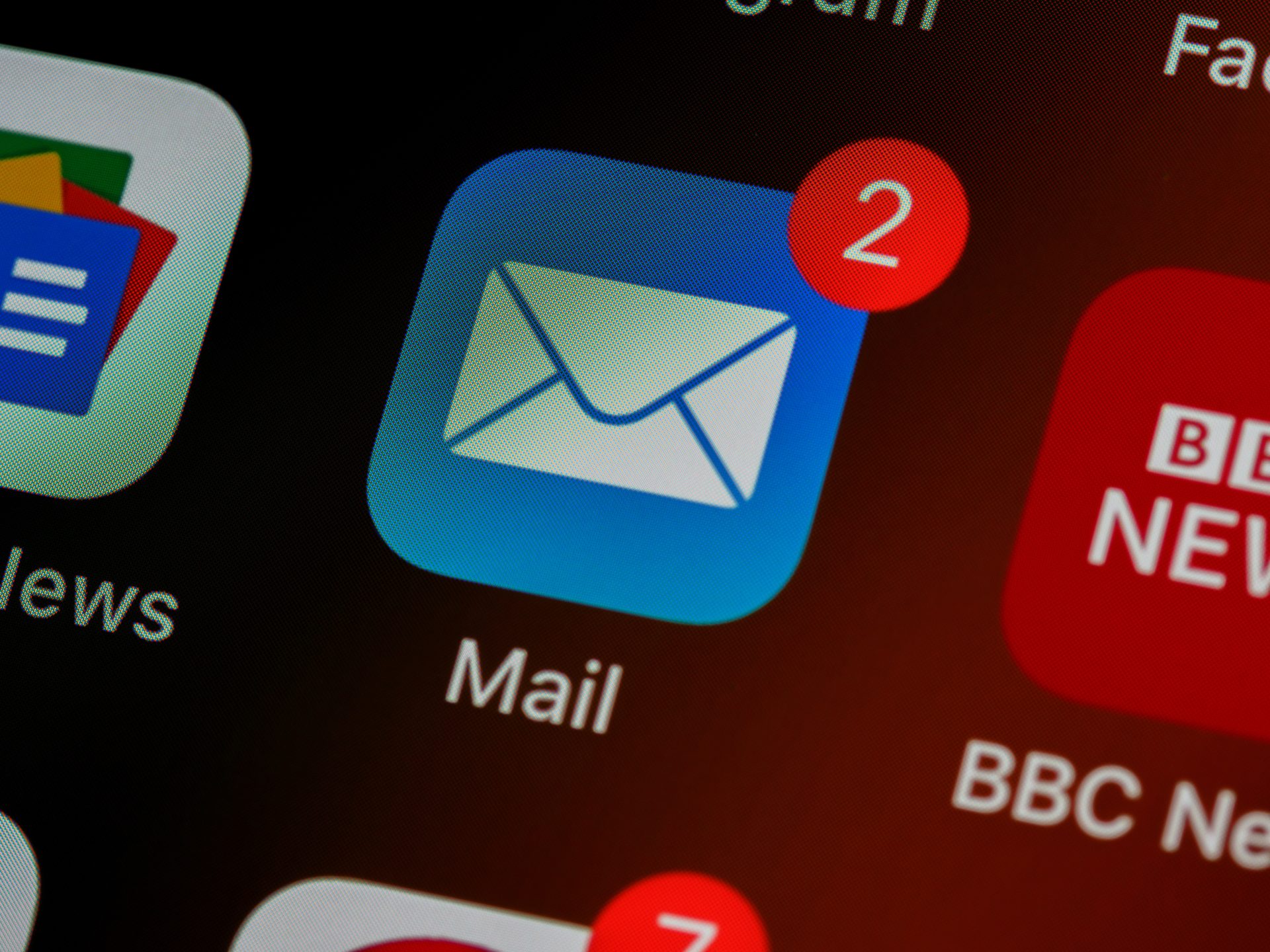
Contrary to what the majority of digital marketers say, email marketing is not dead. When you sign up for any social media channels or websites, what was the first information asked of you? Your email address, right?
Email marketing is still one of the most effective types of digital marketing channels to try. Don’t believe it?
Campaign Monitor shows that 64% of small businesses still use email marketing because it works for them. Not only it is easier than other types of digital marketing channels on the list, but it also offers several opportunities to promote your business.
But, what can you do with email marketing? You can promote your product or services without spending too much on ads! Another reason why email is another great channel is that it lets you build relationships, increase brand loyalty, and gain feedback from your email list.
If you’re going for email marketing, here are some strategies you can apply now:
- Create catchy but relevant subject lines. It’s a challenge to stand out from the typical email noise out there, so it’s best that you come up with subject lines that are catchy, timely, but not too long to cut your pre-header short.
Be careful not to use clickbait subject lines or you’ll end up in the Spam folder.
- Make your message more personalized and engaging. Do you still recall a time when you get snail mails from a friend or loved one? Were you excited? Were you looking forward to their next letter?
That’s how your email should read and feel like. Write your emails as if you’re talking to a specific person in mind. Engage your email list by sharing valuable information about your business or asking questions about how you’ve helped them solve their problem.
- Segment your email list. Keep information relevant to your email subscribers by segmenting your list. It’s best to send different messages to people who clicked, purchased, viewed your product, or were inactive on your list.
Check out our updated comprehensive list of email marketing you can send out to your list.
5. Podcast

Since its launch in 2004, the demand for audio content has gone through the roof. In fact, 57% of the US population listens to the podcast, and the generation with the highest listener shares is the Millennials.
Statista also predicts that there will be 160 million podcast listeners in 2023. That’s a huge potential to meet where your audiences are.
But why you should look into podcasts? Podcasts are a great channel to interact with your audience. Podcast lets your audience listen to your episodes while they’re on a workout, on a morning commute, or on a coffee break. By doing so, you can be more conversational and show your human side to your audience.
If you want to join the podcast bandwagon but don’t know where to start, you may check out BuzzSprout’s step-by-step guide on how to start a podcast. Also, I host The Leadership Stack Podcast where we empower the world’s future leaders and invite feature like-minded professionals as our guests with our episodes.
6. Social Media
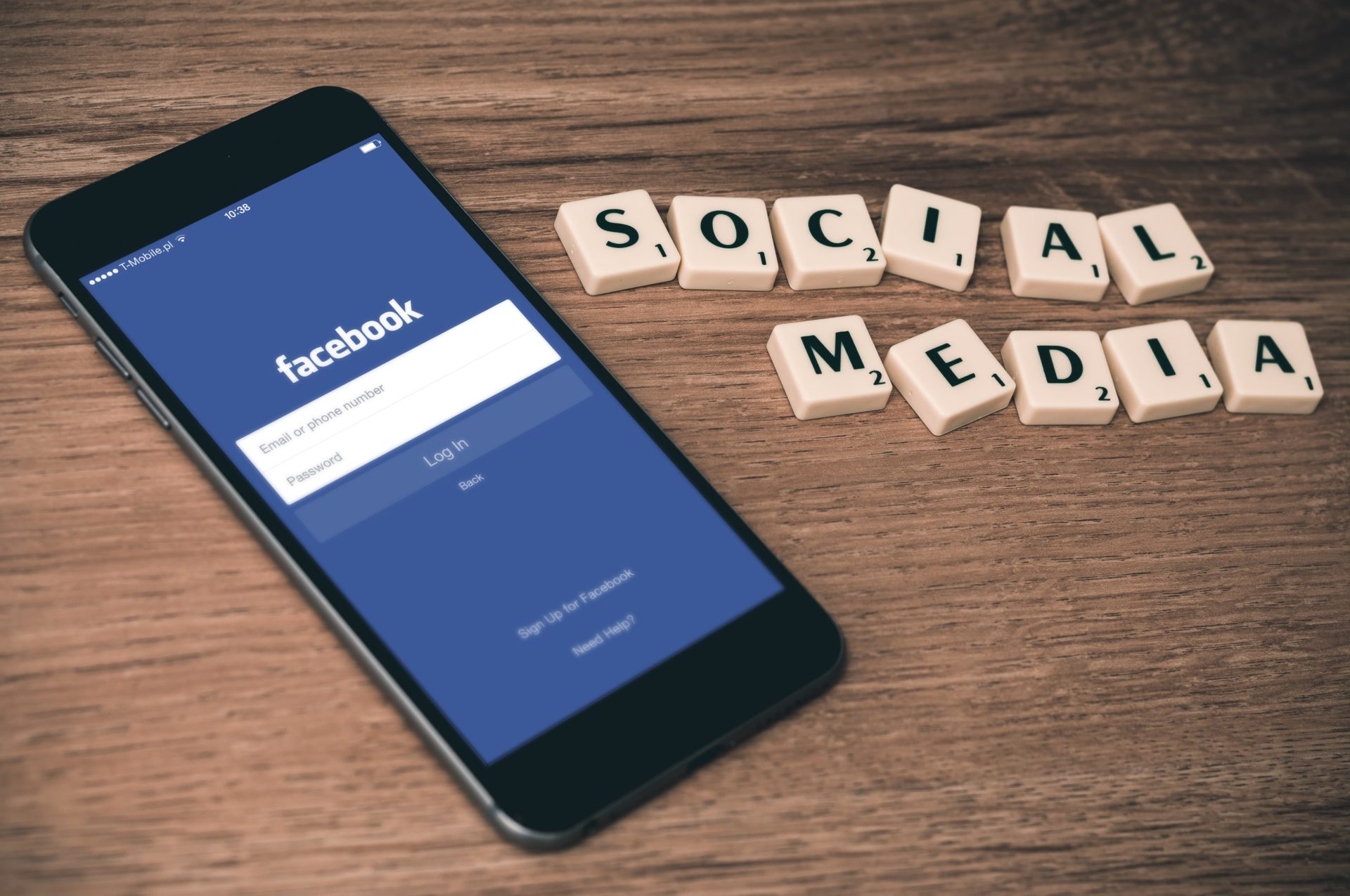
There are 4.62 billion people who use social media worldwide in 2022, and its purpose has significantly transformed over the years.
What used to be a platform to build personal connections has become something much more functional. Most B2Cs (business to consumer) invest in this digital marketing channel because customers spend most of their time there.
According to Data Reportal, there are 6 social media platforms that claim more than a billion active users per month. For this report, we’ll include Twitter, Facebook Messenger, and LinkedIn for your reference:
- Facebook – 2.9 billion monthly active users
- YouTube – 2.56 billion potential advertising reach
- WhatsApp – at least 2 billion monthly active users
- Instagram – 1.47 billion potential advertising reach
- WeChat – 1.26 billion monthly active users
- TikTok – 1 billion monthly active users
- Facebook Messenger – 988 million potential advertising reach
- Twitter – 436 million potential advertising reach
- LinkedIn – 790.4 million monthly active users
LinkedIn is the most used and effective B2B (business to business) social media channel. In October 2021, LinkedIn has at least 790 million members which makes it a perfect channel to reach out to business-minded individuals.
As for the rest of the social media platforms, observe how some brands use it to interact with their customers in real-time. Your customers can like or comment on your post, which can help you decide which content gets more engagement.
At the same time, most social media platforms have chatboxes or direct messaging that either quickly answer your customers’ concerns or inquire about your product or service.
Social media marketing is very effective since it offers a two-way conversation between the brand and its customers.
The two most powerful trends marketers use when they interact on social media are influencer marketing and short-form video content.
If you want to get started on social media channels but are clueless about how to do it, this definitive guide is for you. We’ve outlined 12 easy-to-follow steps on how you can boost your social media presence.
7. Paid Search
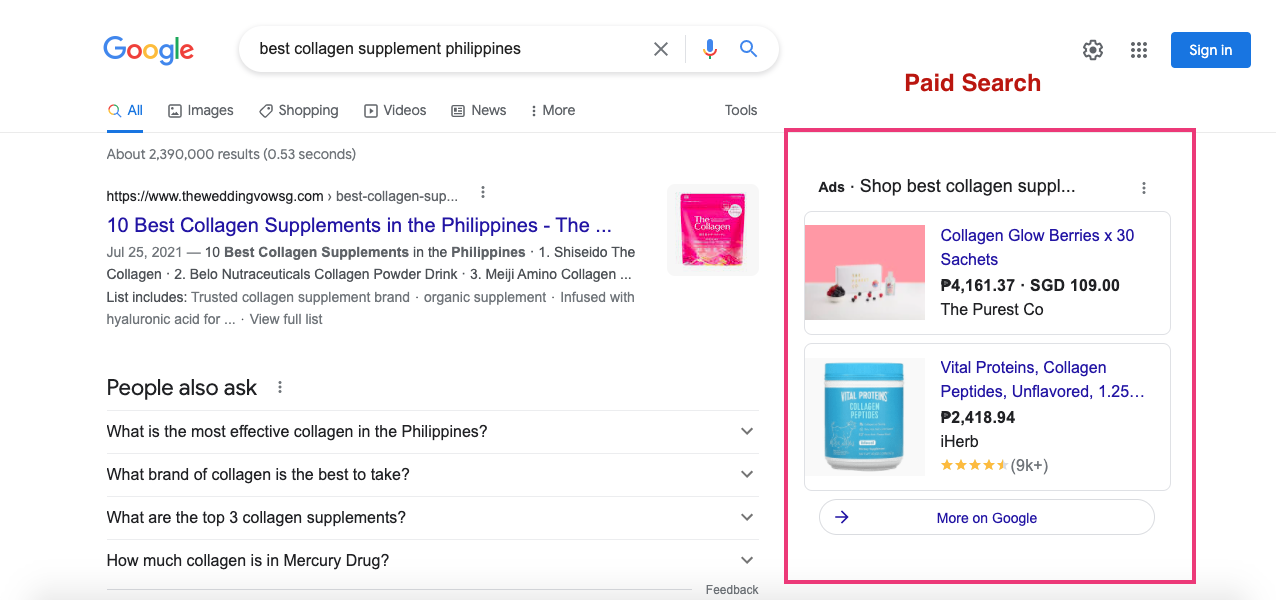
Another popular word for paid search is search engine marketing (SEM). SEO and SEM aren’t similar in the sense that the goal of the former is to rank in organic search. The goal of paid search or SEM is to increase your website traffic with paid ads. You can make use of this digital marketing channel through Google Ads.
One advantage of paid search is it allows marketers to increase the business’ website traffic by putting a paid ad on top of the search results page. Paid ads are made to appear before the organic results. Look closely and you’ll find there’s an “Ad” label before your searched keyword.
Many digital marketers like paid search because it’s easy for them to create targeted ads. You can easily create ads based on users’ searched keywords and location. It lets you create ads based on your targeted demographics as well.
You can outdo your competitors and step up your game with paid search. If you have a new website and you want to rank for desired keywords in no time, then this digital marketing channel might be for you.
You can either do this on your own or work with a digital marketing agency to save time. Be sure to look for an agency that’ll help you earn numerous times over every click you spend.
8. Display Ads
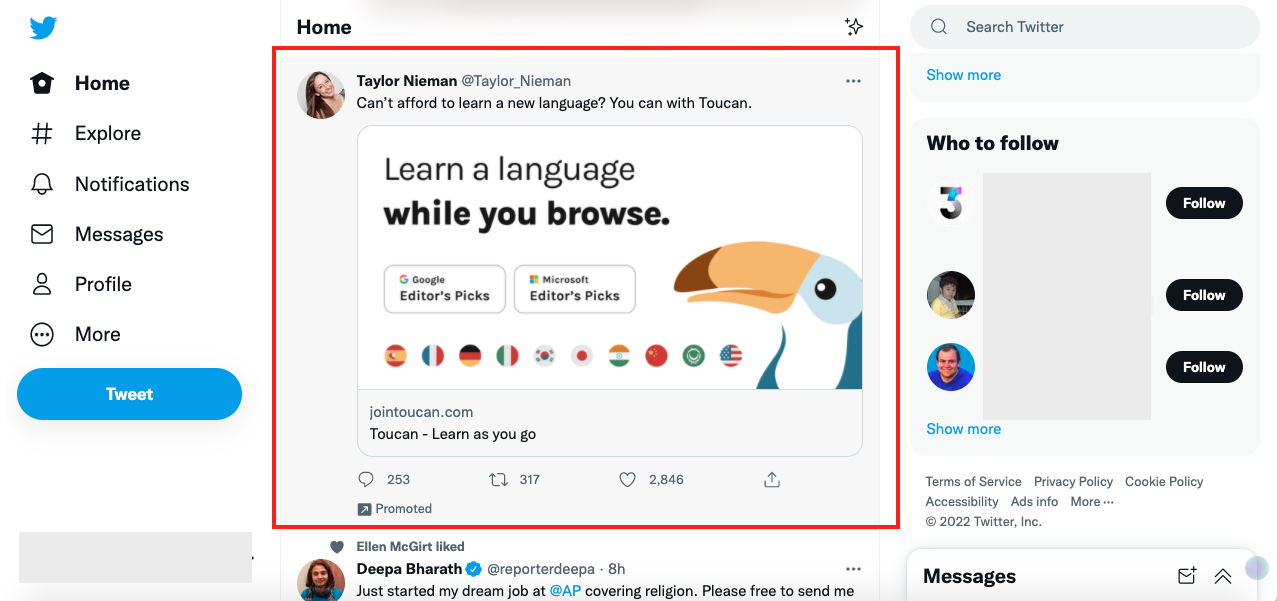
Display ads are another great way to attract the attention of your potential leads, increase awareness about your business, and convince your audience to take action.
These ads are usually in the form of image, text, or video ads that entice the audience to click through to a landing page and make a purchase.
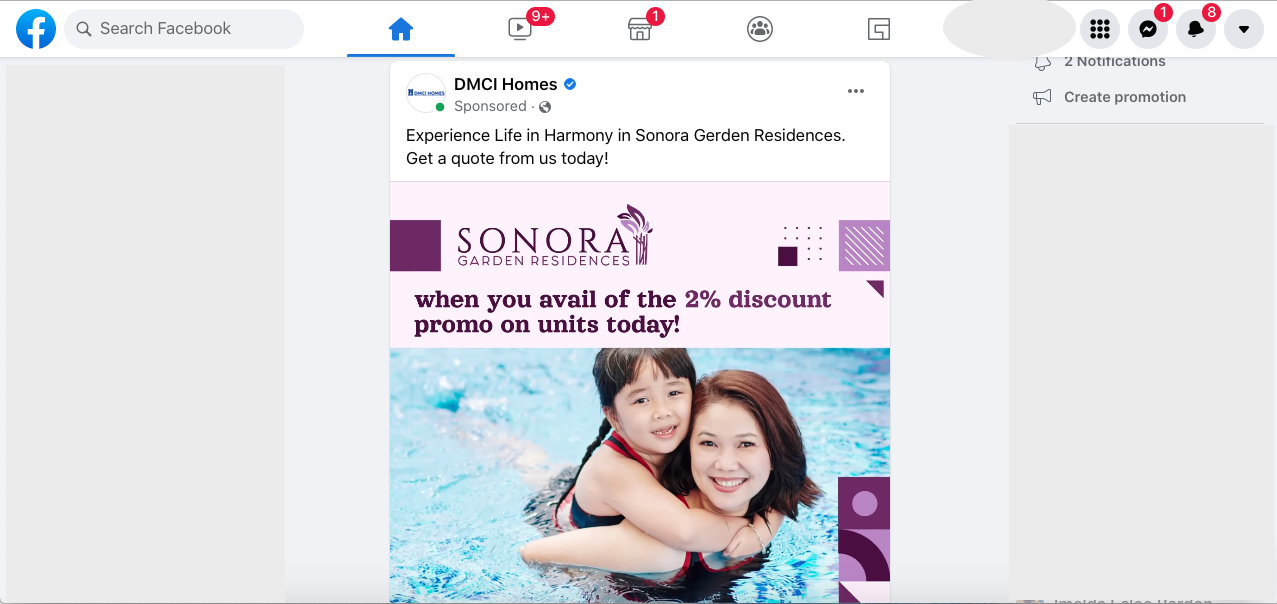
You can tell the difference between a regular personal post on your social media feed and a display ad when you see a gray text that says “promoted” or “sponsored”.
Unlike paid search, display ads aren’t targeted. With this digital marketing channel, you can reach a larger audience with a wider reach.
Ideally, the goal of display ads is to retarget your audience. In the event that customers visit and leave your website and you want them to return, display ads encourage this.
Display ads come in different forms:
- Banner ads – is a traditional form of a display ad. It usually appears as a banner at the top of the website.
- Video ads – these ads are usually found on YouTube, Facebook, and Instagram. Video ads allow you to reach and connect with your audience on a personal level by telling engaging stories. The length of your video ads doesn’t matter but be sure to make it light and engaging.
- Rich media – this ad is video, audio, and clickable engaging elements combined. This ad offers ways to interact with the audience.
9. Mobile
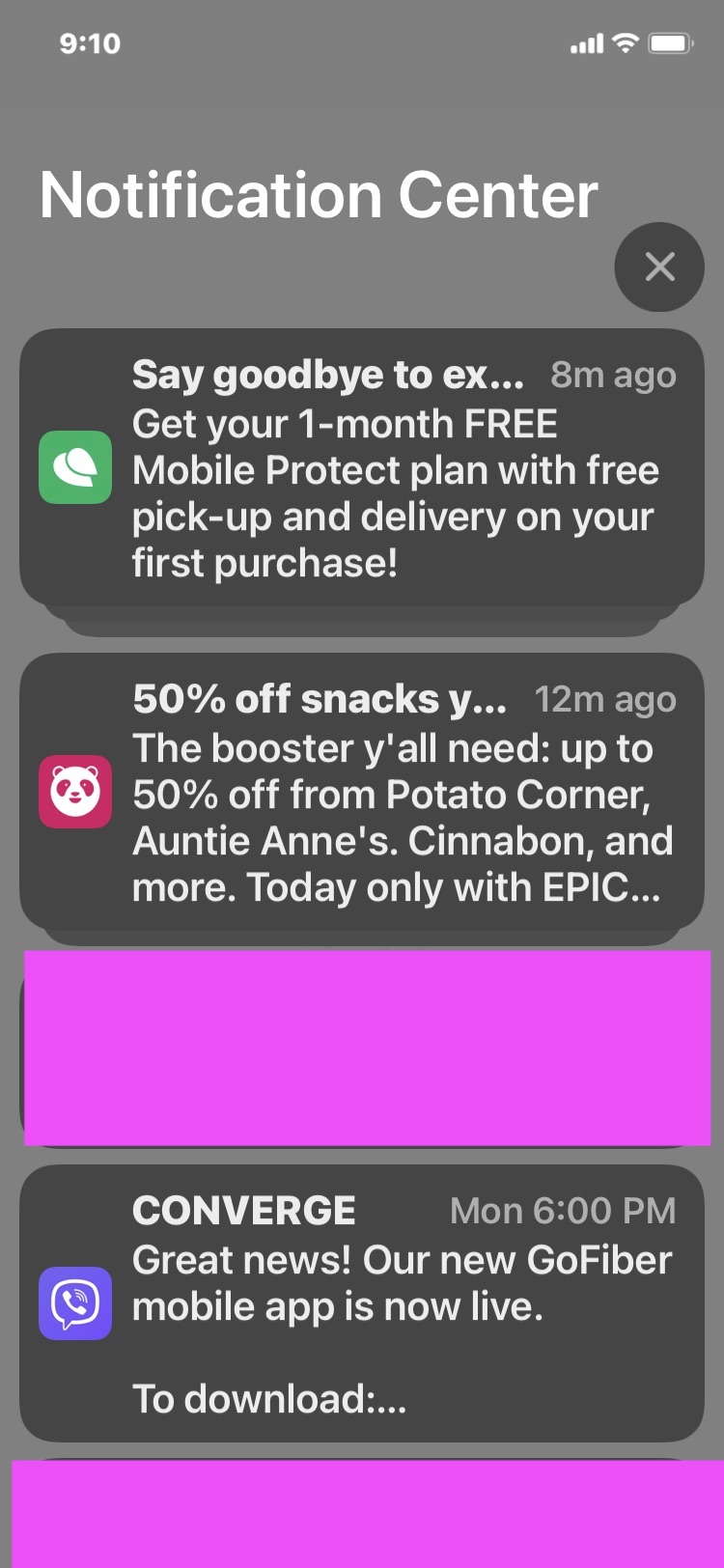
If you haven’t thought about reaching your potential audience via their smartphones yet, now’s the time to do so.
According to GSMA Intelligence’s latest data, there are now 5.31 billion unique phone users around the world. In addition, unique mobile users are still growing at a rate of 1.8 percent every year.
Furthermore, the rise of voice search on mobile continues. What does this tell you as a business owner?
You have to make yourself visible on mobile devices such as smartphones and tablets. To do this, you may utilize the following mobile marketing strategies:
- SMS – never underestimate SMS’ (short message service) potential. You can keep your customers updated about your product or if you have any ongoing promotions.
- Mobile-based app – 80% of mobile users spend more time on different mobile apps, but it doesn’t necessarily mean you have to build your own mobile app.
It’s true that mobile apps are nice to have in businesses. However, you can still promote and create mobile ads that show within third-party mobile apps. Google AdMob lets you create ads not only in mobile apps but also in display ads like rich media, video, and text interstitials.
- QR codes – QR (Quick Response) codes encourage mobile phone interaction and engagement. It helps businesses provide more information about their product or service to their customers’ mobile devices in a jiffy.
Also, QR codes can be added to brochures, posters, billboards, or any advertising material to provide mobile users with more information about your product or offer.
- Instant messaging – it’s easy to sign up for WhatsApp, Facebook Messenger, WeChat, and Viber accounts. If you want to get in touch with your audience and respond to them in a flash, instant messaging is the way to go.
10. Video Marketing
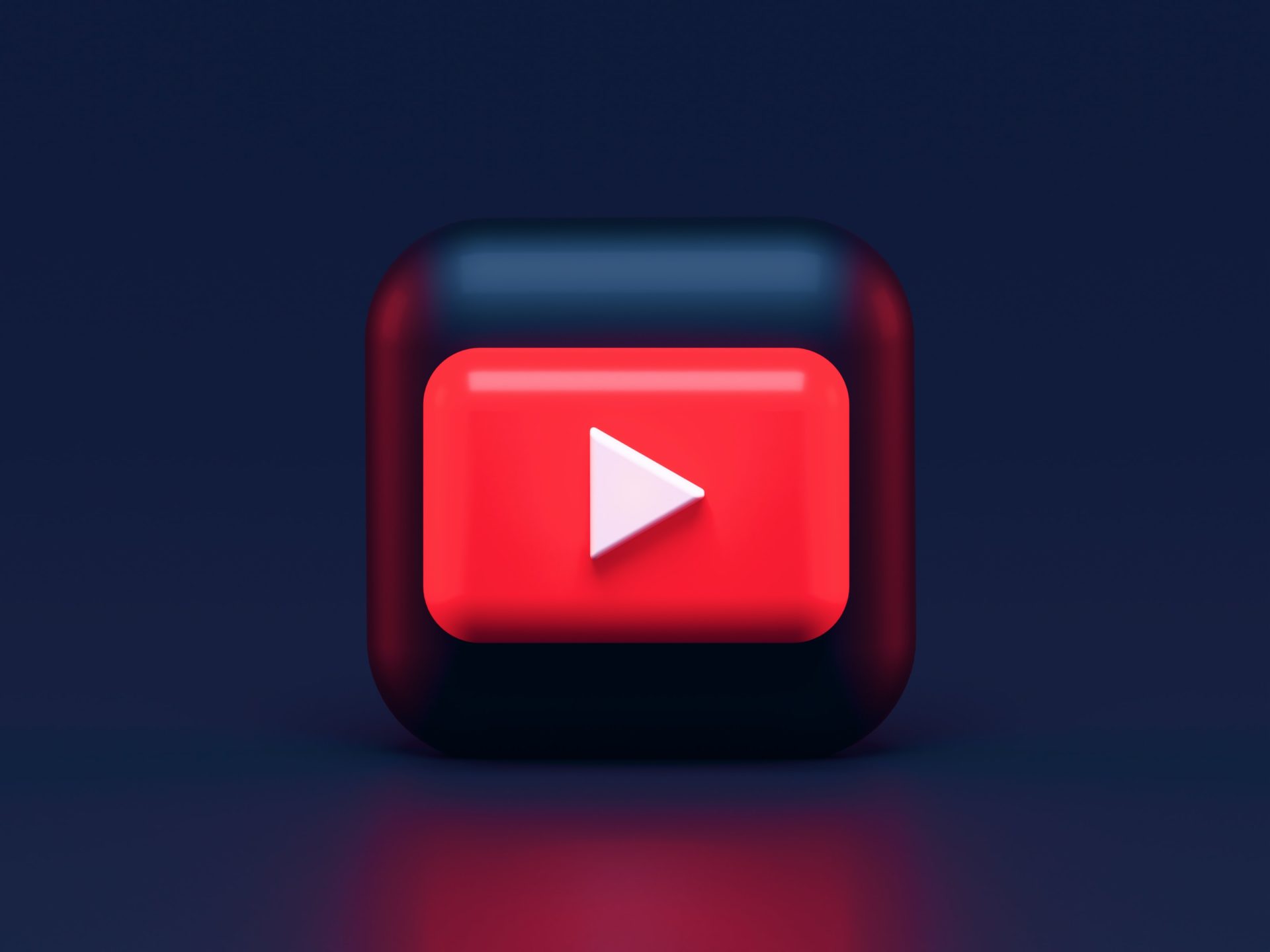
Still on the fence about where to put your online efforts for your business? You should consider video marketing.
Gone are the days when creating videos for your business is just an option. If you want to be relevant, it’s imperative you dive into it! Nowadays, people are more likely to watch video content from a company they support.
What this also means is that video content helps increase your open and conversion rates, improve your ROI and help nurture your relationship with your customers.
A survey conducted by Statista showed that 60% of their respondents watch YouTube multiple times a day. On the other hand, 54% of their respondents engage with TikTok more than twice per day.
So, which type of video content should you create? You can do the following:
- Instructional or How-To Video – this is one of the best ways to provide your audience information or knowledge about your product and understand how it works.
- Explainer video – this is perfect for products or services with technical concepts. You may also create animated videos to explain in a simple format how your product or service works.
- Live video – this video format proves to be the most engaging type. It encourages audiences to interact by asking questions in the comments section in real-time.
- Brand video – ideal for sharing your brand’s vision and mission, or for showcasing your brand’s products or offer.
- Testimonial video – the best type of user-generated content ever! You don’t have to put a lot of marketing effort into this because your customers will do the market for you.
- Product demo video – this is where you showcase your product’s benefits and features. This type of video should be comprehensive to provide the best user experience.
The best digital video channel to start with is YouTube. Not only because it has one of the largest audience reaches, but also because it’s the internet’s second-largest search engine.
YouTube helps you cast a wide net for search traffic, so if you’re not doing YouTube yet, you’re missing out on a lot. If you want to dive deep into how YouTube can help improve your overall presence and improve your SEO, here’s our definitive guide to YouTube SEO.
However, if you want to showcase your creative marketing side and create short-form videos on TikTok, check out our post about TikTok SEO. Here we discussed why TikTok is an ideal venue for product promotions and what Google is doing to make TikTok videos appear in organic search.
Key takeaway
It is now easier to grow leads and increase sales with so many types of digital marketing channels available. This isn’t to say you should utilize every digital marketing channel discussed here.
This also doesn’t mean you should only focus on one digital marketing channel. In order for any of these channels to work wonders for your business, you need a well-thought-out marketing strategy in place.
I also noticed how omni-channels work wonders for brands nowadays. If you want to stay ahead of the game and keep abreast with your customers’ needs, it’s important to leverage more than one to three marketing channels. Include that in your marketing strategy so you can stay competitive.
![10 Types of Digital Marketing Channels to Try [in 2022]](https://seo-hacker.com/wp-content/uploads/2022/02/10-TYPES-OF-DIGITAL-MKTG-TO-TRY_Cover-Photo.jpg)